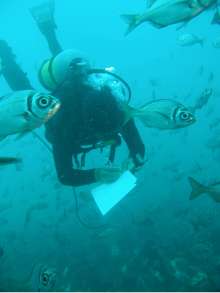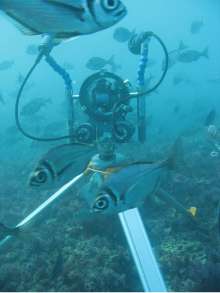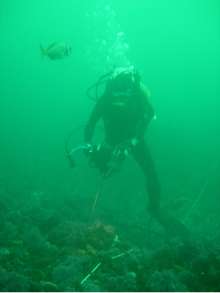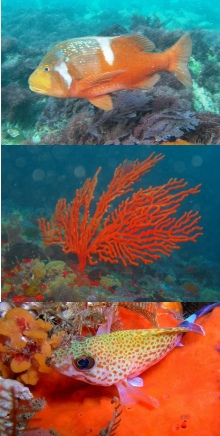Changing times in the marine environment: Why monitoring matters
|
- By Anthony Bernard and Dr Albrecht Götz
The collapse of many valued marine resources is a direct result of man’s historical and continued exploitation of the oceans.
Rocky reefs are one of the most exploited marine ecosystems in the world, and are under increasing pressure from rapidly expanding coastal human populations. Although widespread, coastal resource exploitation is localised to regions and user groups. As such, the cause and impact can be regulated by regional and national coastal management plans.
Given sufficient background knowledge, well-designed management protocols have the capacity to sustainably regulate the harvest of marine organisms, however in order to measure the success of these management efforts it is crucial to provide decision makers with reliable long-term resource trends.
Climate change
Climate change is expected to have significant global impacts on the composition and structure of near-shore reef communities and, although the control of climate change is beyond the scope of coastal managers, it is imperative that the impacts on coastal ecosystems are documented and the knock-on effects to the already vulnerable resource base are understood.
To develop management strategies that work towards the sustainable utilisation of marine resources, the effects of climate change need to be separated from anthropogenic exploitation. One way to do this is to make use of reference monitoring sites that are void of direct human impact and act as control sites where changes in community structure reflect that of natural and climate induced oscillations in the population trends.
No-take Marine Protected Areas (MPA) are ideal in this regard as the reefs within their boundaries are protected from human reach. No-take MPAs can be regarded as large-scale ecological experiments that exclude a top predator (humans), and as such have profound ecological, social and economic implications.
Although primarily established as a fisheries management tool, no-take MPAs are now recognised for their broader utility in managing biodiversity and ecosystem resilience. In this regard the scientific community has realised that monitoring programmes in no-take MPAs serve as necessary controls against which the rate of environmental deterioration can be gauged, and global change can be monitored.
Long-term monitoring programmes are one of the best ways to document change in environmental systems. Although ecological modelling has the ability to predict changes in community structure, a sound knowledge of the key ecological interactions is essential. The predicted ocean warming through climate change is expected to have significant effects on the composition, structure and distribution of marine communities, but it has already been demonstrated that change does not always occur in accordance with that predicted from prior knowledge of ecological interactions. As such long-term monitoring programmes appear to be the best bet to shed light on our current situation.
MPA reef monitoring programme
With this in mind, the SAEON Elwandle Node, Rhodes University, the World Wide Fund for Nature (WWF), the South African National Parks (SANParks) and the Table Mountain Fund (TMF) have begun coordinating a MPA reef monitoring programme which aims to rationalise research and methodology, improve collaboration between research and management institutions and convey tangible benefits to the general public.
For the programme to be successful a number of objectives need to be addressed and met:
- From an ecosystem perspective – Monitoring programmes need to cover different habitats from the inter-tidal to the sub-tidal, and not only focus on monitoring exploited species of interest, but look into ecosystem functioning as a whole.
- From a monitoring perspective – A standardized monitoring protocol based on the comparative suitability of available monitoring methods and survey approaches needs to be developed.
- From a management perspective – a monitoring network that provides population benchmarks from reference sites (No-take MPAs) and resources trends from exploited regions needs to be established.
- From the public’s perspective – tangible benefits need to be delivered through encouraging public participation in scientifically sound volunteer reef monitoring programmes.
The project is now into its third year and the planned research aims to build on the results from 2006/2007 where various sub-tidal reef survey methods to assess fish populations were compared in the Tsitsikamma National Park MPA. This year will see the research expanded to encompass invertebrates from the inter-tidal and sub-tidal regions, while the typical visual monitoring methods will be expanded to include various diver and boat deployed videometric techniques.
This year will also see the start of an exciting public participation component that will be based in the Table Mountain National Park MPA. In this component SAEON Elwandle Node researchers will collaborate with SANParks, TMF and WWF with the aim of encouraging non-scientists to participate in monitoring programmes. The initial objective is to assess the ability of different divers (scientists, recreational divers and commercial divers) to collect environmental data using the methods outlined in our protocol, and from there develop a training programme.
SAEON was established in South Africa to facilitate the development of long-term observation and research that provides information needed to address environmental issues. The goal is for this information to then be transferred into policies and strategies which promote the judicious use and management of goods and services that are provided by ecosystems.
In this regard the MPA programme initiated through SAEON Elwandle Node promises to fulfil and deliver on a number of SAEON’s mandates. Further, by providing environmental information and trend data based on sound scientific and monitoring principles to decision makers, scientists and civil society, the MPA programme will contribute towards South Africa meeting the requirements of a number of international conventions (CITES, RAMSAR, etc).
The MPA programme at SAEON is headed up by Dr Albrecht Götz, who has conducted extensive research on MPAs in the warm temperate biogeographic region of South Africa. Anthony Bernard joined the programme towards the end of 2007 and the development of the monitoring protocol is going to form the core of his PhD thesis.
Although integral to the programme, the monitoring protocol is just the first step in our goal to develop a long-term dataset that advances our understanding of the impacts of human and global climate change on our coastal ecosystems. To ensure the establishment of monitoring nodes and the overall success of the programme, buy-in from the major players in conservation, research, management and public sectors in South Africa needs to be secured.
For this, collaborative research that offers each party an incentive and works towards common goals will be crucial.














